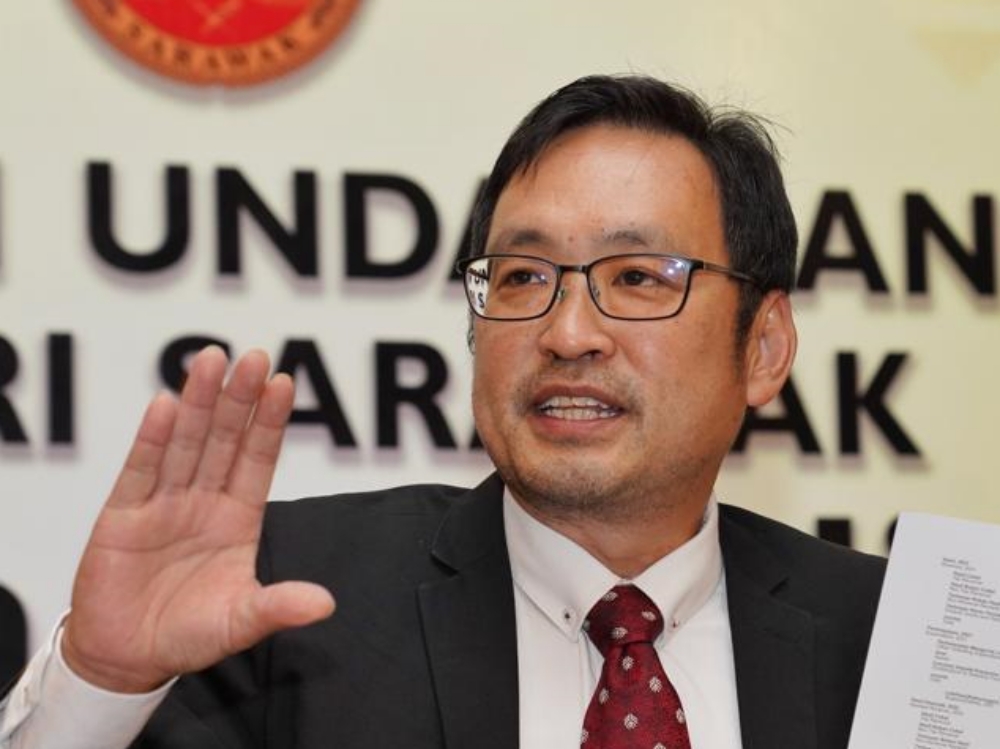ADVERTISE HERE

Wung in a statement points out that despite Chong’s vocal opposition during public speeches, he failed to raise this issue in Parliament, leading to disappointment among DAP supporters. – Photo by Chimon Upon
KUCHING (July 26): SUPP Kuching branch’s Grassroots Operation chief Cr Nicholas Wung Duk Ying yesterday claimed that Stampin MP Chong Chieng Jen was being inconsistent on issues over the extension of electronic invoicing mechanism to micro-enterprises and hawkers here.
Wung in a statement pointed out that despite Chong’s vocal opposition during public speeches, he failed to raise this issue in Parliament, leading to disappointment among DAP supporters.
On May 2, 2024, during the DAP Kuching branch annual meeting, Chong Chieng had stated that “Sarawak DAP does not agree with the government’s plan to extend the electronic invoicing mechanism to micro-enterprises and hawkers by mid-next year. Sarawak DAP’s representatives will oppose this in Parliament”.
Wung argued that mandatory electronic invoicing for hawkers would increase the complexity and costs for micro-enterprises and hawkers, which would ultimately be passed on to consumers.
“This (Chong’s) statement, widely reported in Chinese-language newspapers, garnered significant attention from micro-enterprises and hawkers across Sarawak, who hoped Chong or the other four Sarawak DAP MPs would advocate for their cause in Parliament,” said Wung.
“Parliament was in session from June 24 to July 18 during which 27 bills were passed in 15 days. Did Chong Chieng Jen actually speak out against electronic invoices in Parliament? And did the other four Sarawak DAP MPs support his speech?
“If all five MPs merely concur with the decisions of Pakatan Harapan (PH), can they truly reflect and safeguard the needs and wishes of the Sarawak people? Would this lead to disappointment and distrust among the voters?” he asked.
There is speculation among the public that the DAP MPs have changed their minds after changing their positions, Wung added.
The PH-led Unity Government, in power for nearly two years, initially raised the service tax (SST) to eight per cent to address the substantial fiscal deficit, which contributed to inflation.
Now, they plan to introduce the electronic invoicing system, claiming it will prevent tax evasion by large companies.
The tax authority further extended the law to include the ‘shadow economy’ groups, such as gambling and money laundering, which comprise 20 per cent of the GDP, said Wung.
Micro-enterprises in Malaysia, including barbers, food vendors, vegetable vendors, and grocery stores, typically have few or no employees.
In many small communities, hawkers work primarily to supplement their income, with elderly hawkers aiming to pass the time.
Their daily sales are often just a few hundred ringgit, and after deducting costs and living expenses, they barely make ends meet, Wung added.
Facing inflation, many small traders complain that PH’s reforms are worsening their situation, he pointed out
According to Section 120 of the Income Tax Act 1967, failure to comply with the electronic invoicing system without a reasonable excuse constitutes an offence.
Upon conviction, offenders can be fined between RM200 and RM20,000, imprisoned for up to six months, or both.
This severe law causes significant anxiety among micro-enterprises and hawkers, Wung said.
Many do not understand online data, lack mobile data, and need to hire people, buy equipment and purchase software, leading to higher prices for goods and triggering further inflation.
They worry that any procedural mishandling could result in fines or court proceedings, he pointed out.
Wung noted that although Second Finance Minister Amir Hamzah Azizan announced on July 16 that hawkers with annual earnings below RM150,000 are not required to issue electronic invoices, this threshold provides limited relief for micro-enterprises and hawkers in Sarawak.
He then urged the government to consider the appeal from the Federation of Sarawak Hawkers Association, which represents the voice of many small traders, and to postpone the implementation of electronic invoicing for micro-enterprises and hawkers scheduled for next July.
Wung emphasised the need for a long-term perspective to reduce the burden on the people.









 English (US) ·
English (US) ·